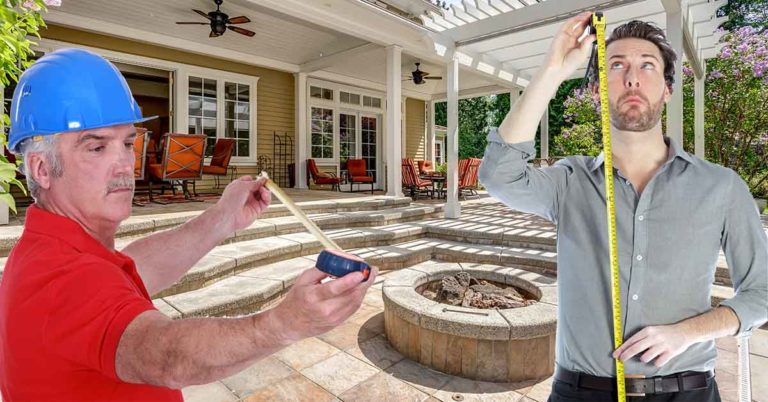Can Outdoor Heaters Be Left Out in the Rain? (Do They Get Damaged?)
As the temperatures drops, many of us yearn to spend more time outdoors, whether enjoying a cozy meal on the patio or gathering around with friends. But what happens when the rain starts to fall?
Can your outdoor heaters weather the storm?
In this article, I’ll explore whether outdoor heaters can be left out in the rain and whether they’re at risk of damage.
Can Outdoor Heaters Be Left Out in the Rain?
Outdoor heaters can be a great way to extend your outdoor living season, allowing you to enjoy your patio or backyard even when the temperatures drop.
However, what happens when Mother Nature throws a wrench into your plans? Are outdoor heaters equipped to handle the rain, or do you need to take special precautions to protect them?
Let’s examine the issue of outdoor heaters and rain and provide helpful tips for keeping your heaters safe and functional.
For starters, outdoor heaters can be left out in the rain, but you should take precautions to protect them from water damage.
Most outdoor heaters can handle some exposure to the elements. However, prolonged exposure to rain can cause rust, corrosion, and other damage that can affect their work and lifespan.
Here’s a list of tips to help you keep your outdoor heaters safe and functional in wet weather:
Choose Weather-Resistant Heaters
When shopping for outdoor heaters, look for models specifically designed for outdoor use and labeled as weather-resistant or waterproof.
These heaters typically feature components that withstand moisture exposure, such as rust-resistant materials, waterproof controls, and sealed electrical connections.
Use Covers
Even if you have weather-resistant outdoor heaters, investing in weatherproof covers for protection against rain and other elements is still a good idea.
Covers can help prevent water from seeping into the heater’s components and causing damage and protect the heaters from other weather-related damage, such as sun fading.
Follow Manufacturer Instructions
Always follow the manufacturer’s instructions for using and storing your heaters.
These instructions may include tips for protecting the heaters from moisture, such as covering them when not in use or bringing them indoors during extended periods of rain.
Avoid Direct Exposure to Rain
If possible, try to place your outdoor heaters in a location protected from direct exposure to rain, such as under an awning or in a covered patio area.
Relocating your outdoor heaters someplace dry and sheltered can help reduce the amount of moisture they’re exposed to and the risk of damage.
Clean Your Heaters Regularly
Dirt and debris can accumulate on outdoor heaters over time, trapping moisture and accelerating rust and corrosion.
Therefore, clean your outdoor heaters regularly using a soft cloth or sponge and a mild detergent solution, and rinse them thoroughly with clean water to remove soap residue.
Store Your Heaters Properly
If you’re not planning to use your outdoor heaters for an extended period, storing them indoors or in a covered area is a good idea.
Proper storage can help protect your heaters from rain, snow, and other weather-related damage that can occur over time.
Check for Leaks
Regularly inspect your outdoor heaters for signs of leaks or other damage, such as rust or cracks. If you notice any issues, call a professional to have them repaired or replaced as soon as possible.
Use Extension Cords Safely
If you need an extension cord to power your outdoor heaters, use one rated for outdoor use and designed to withstand moisture exposure.
Keep the cord off the ground and away from water to reduce the risk of electrical shock.
Don’t Overload Your Circuits
Check your electrical circuits to ensure they can handle your outdoor heaters’ power requirements.
Overloading your circuits can cause electrical fires and other hazards, so it’s important to use caution when using electrical appliances outdoors.
Use Caution When Using Propane Heaters
If you’re using propane heaters, follow all safety guidelines and use caution when handling propane cylinders.
Never use propane heaters indoors or in enclosed spaces, and keep the cylinders away from heat sources and other flammable materials.
Also, store propane cylinders in a cool, dry place and follow proper disposal procedures when empty.
In our other article, we look closer at the potential dangers of outdoor heaters (can they explode) and how to stay safe while using them.
These simple tips help ensure your outdoor heaters stay safe and functional, even in wet weather conditions.
With a little care and attention, you can enjoy the warmth and comfort of your outdoor heaters for many seasons.
Final Words
As you can see, outdoor heaters can be left out in the rain. However, taking some basic precautions to protect them from water damage is important.
Investing in weather-resistant covers, choosing heaters with waterproof components, and following the manufacturer’s instructions for use and storage can help ensure that your outdoor heaters will last for many seasons.


